Billions of viewers watched the Tokyo Olympics this summer. And there were countless feature stories about the 1964 Olympics, when Japan first hosted the games, including a detailed recounting of the historic showdown between German and American teams in the eight-man rowing competition, a marquis event in that era, however, none mentioned the Irish American connection, until now.
Story by Joe Quinlan
It’s still considered one of the greatest Olympic throw-downs ever.
And there’s a connection to the Northwest of Ireland that continues to this day.
Irish sports fans in Mayo and Donegal are used to facing off as worthy opponents. But in 1964, it was the grandsons, one Catholic and one Protestant, of these two proud counties who combined to conjure up Olympic immortality.
Some Background:
The Rome Olympics in 1960 had brought regime change in the tightly knit rowing world. Americans had long dominated the sport, using university level teams to win Olympic gold for 40 years. But the West Germans turned the rowing world upside down that year with new training techniques and a club team brought gold back to Hamburg. Four years later, they confidently planned to do the same, although the Soviet team also had designs on winning gold.
Plan A for the U.S. that summer was for two of its greatest ever college teams—Harvard and Cal, both undefeated—to face off in the Olympic trials for the right to try to reclaim Olympic gold. But back in Philadelphia, Plan B was being cooked up.
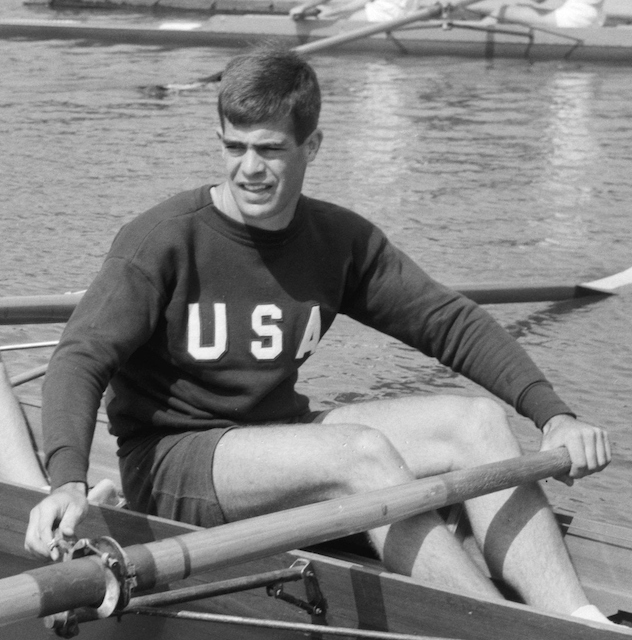
The head chef was one John B. Kelly Jr. who ran the legendary Vesper boat club. Nicknamed “Kell”, he had won Olympic bronze and his legendary father, Jack, had won three Olympic golds. Jack Kelly’s father was born in a humble Mayo thatched cottage near Westport. Jack, who made his fortune with a bricklaying company, also had an actress daughter whose fame would exceed them all. They were the Irish American royalty in Philadelphia.
“Kell” left the Rome Olympics knowing that America needed to send a unit better than any college team, and his recipe was to recruit an eclectic group… older, heavier and stronger than before.
He built the team mostly with hard charging American soldiers and sailors.
For more than a century, young American servicemen who were elite athletes were “assigned” to train for the Olympics. The first-ever was a 26-year-old army officer named George Patton at the 1912 Stockholm Olympics. Kell’s 1964 Vesper team in fact had five active servicemen, with all four branches represented, an unprecedented combination.
Step one was to win the US Olympic trials, where Vesper triumphed against long odds. The headlines of the day called it “An Aquatic Shocker.” And then it was off to Tokyo for the first Olympics ever held in Asia. Most observers thought they would be lucky to win even a bronze medal. Instead, with the world watching, they brought home the gold.
The longshot victory could not have come at a better time for Philadelphia and its beleaguered sports fans. Just weeks before the Tokyo triumph, the hapless hometown baseball team had suffered a monumental meltdown, losing 10 straight games in the final two weeks of the season. Phillies fans still refer to the “Phold” and on Wikipedia it reads bluntly: “…one of the most notable collapses in sports history.”
Never was a morale-boosting victory more needed by a city.
And it came from the most unlikely of teams. While the nine man lineup of the Phillies would flounder and fail, the nine men of Vesper club would come together in triumph to claim their gold medals.
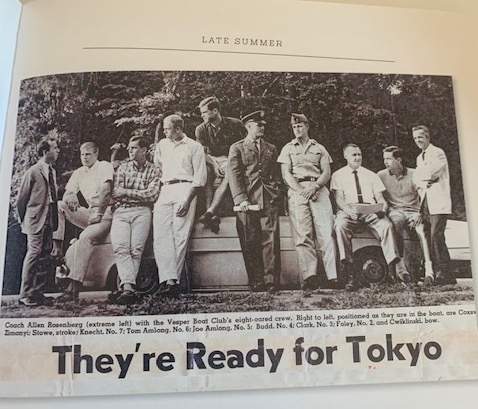
Wrote the New York Times: “They scored a smashing, thoroughly convincing success in the eight-oared race, the number one rowing event in the world. They won it for the United States in general and for Philadelphia in particular.
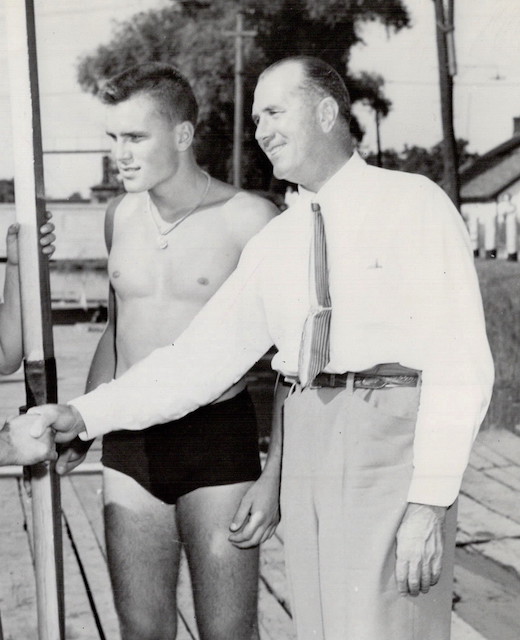
Perhaps the most memorable oarsman in the boat was also the largest: a handsome Marine and Ivy Leaguer. His name was Harold Boyce Budd and he projected a preppy All-American image. His father’s English ancestors had arrived in America in the mid-17th century. What every sports writer then and since missed, however, was Budd’s deep connection to Ireland, specifically Donegal. While the Kelly clan was second only to the Kennedys with Irish Americans, its connection to Ireland was mostly through a few brief visits made by Kell’s famous younger sister, only after she became Princess Grace of Monaco.
Budd’s connections ran much deeper, visiting dozens of times, sometimes for two months or more. Deep enough that Donegal can practically claim him as a hometown Olympic winner.
Boyce began visiting Ireland in the late 1940s to stay at the summer home of his beloved grandfather. William McKinley was born, the youngest of nine, into a solidly Protestant family near Balintra outside of Donegal town in 1882. After emigrating to the US and marrying a Fermanagh native in 1907, he began returning to Ireland for summer-long stays in the 1920s, bringing first his children and then grandchildren to the house he purchased in 1928. Named “The Hilltown”, it stood just a quarter mile from where his ancestors were buried in Drumhome Old Church cemetery. It’s just a short walk to the beach (and golf) at Murvaugh. McKinley would make his fortune in the New York City meat and poultry business, but his heart remained back in his beautiful birthplace.
“My grandfather was extremely proud of being Irish and he wanted his kids and grandkids to share that pride,” says Budd, now 81 and living an active retirement.
“I remember taking steamships to visit him starting in the late 40s. Donegal had way more horses than cars back then. He loved to meet up with the locals, including the Catholic parish priest who would visit our house. He also made sure I learned the old ways, like working with a local farmer to cut hay with a scythe. It was backbreaking work.”
Boyce says his interest in rowing was piqued when he saw a picture of a U.S. Olympian while a high school senior. But his rowing “career” actually started earlier, according to a summer neighbor of his family.
Trevor Johnson remembers growing up in the 1950s down the road from the Hilltown house and vividly recalls seeing Boyce and his brother David rowing their grandfather’s boat in Donegal Bay.
Budd made the Yale varsity team as a sophomore but was demoted to the junior varsity his last two years. The following year, while studying at Cambridge, he was spotted near the dock as he was watching various boats, one of which had an empty seat. He was urged to give it a try and wound up in the winning boat when Cambridge beat Oxford in their annual clash in 1962.
Back stateside the following year, Boyce joined the Marine Reserves but he still had the rowing bug. H convinced a fellow Yale rower who had also enlisted that they should reunite in Philadelphia and train as a pair for the Olympics. The Marines cooperated, but the man running the storied Vesper yacht club had a different plan. He convinced the pair to join the eight man boat, which would make history.
Post Olympics, Boyce continued with rowing sporadically but would eventually shift his attention to completing his Marine reserve service, which he did in 1968. By then he had moved into the air shipping and freight industries, where he would own several companies. He and wife Karen would devote much of their free time to the issue of land conservation, leading efforts statewide in Pennsylvania and then in their adopted hometown of Tinicum township, 40 miles north of Philadelphia.
His neighbor Gary Pearson served with Budd as a locally elected township supervisor for 12 years and says that his friend is the very picture of a patrician. ”He went to Lawrenceville Prep and Yale, ran his own companies…served in local government and has been a real leader on land conservancy.”
Pearson adds, “What does not show up, unless you know him, is how proud he is of his Irish roots. He’s gone almost every year since I’ve known him. And he’s a big, big booster of Donegal in particular. He is a walking, talking billboard for Irish tourism.”
Just like his grandfather, Boyce has used “The Hilltown” to bring his extended family together for long stays and vigorous hikes around Donegal. Three decades ago, he, his sister and brother (who spent a year each studying at Trinity and Queens Belfast, respectively) decided to carry on the family tradition and renovated his grandfather’s house. They’ve visited most every year since then and to the right families, they will even rent out the house a few weeks a year to enjoy the beauty of Donegal in a very congenial setting (visit VRBO.com/131249). And while you can share in his family history by renting the house on the hill, you won’t catch even a glimpse of the famous medal. Sadly, it was stolen from his home in Devon, Pa more than 40 years ago.
In the summer of 2019, a Budd family group of 17 spent two wonderful summer weeks together in and near The Hilltown. He’s even spent Christmas in Baluntra…twice. And happily recalls his honeymoon there…50 years ago this july in fact.
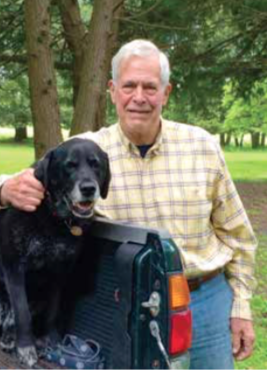
And he’s got a million stories about Donegal. “My favorite memory of rowing in Donegal happened many years after the Olympics, which the local fishermen of course knew about. My pal (and fellow gold medalist) Emory Clark was over visiting and we were challenged to a point to point rowing duel. The locals knew all the angles and our boat leaked but what really mattered was that our coxswain, a local restaurant owner, had us laughing so hard that we actually stopped rowing for a bit. But, I want to be clear: they kicked our butts…and were proud of it.”
This summer, Covid has kept Budd from travelling to his Irish home, so he and Karen compensated with a weeklong biking tour to Oregon. He hopes to be back to Donegal to The Hilltown next summer. He and his brother have also put in the paperwork for their Irish passports.
When we spoke prior to the Olympics, he siad that he planned to eacth the games on a family vacation near the beach on Long Island, just a few miles from where his Budd family ancestors first landed almost four centuries ago. He was rooting for the Americans of course, but also for the upstart Irish team which won its first rowing medal ever in Brazil in 2016.
“Those two brothers from Skibbereen (Paul and Gary O’Donovan) who won silver last time are terrific…they are also two of the funniest people you will ever see in a video. That’s two reasons to root for them!”
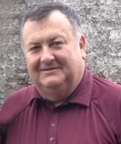 Joe Quinlan spent more than a decade working for Robin MacNeil and Jim Lehrer for their Report/ NewsHour on PBS. He was later president of two Time Inc television production companies. He has served on the board or advisory board of seven different not-for-profits, including Glucksman Ireland House at NYU, where he received his MA in 2013. He started his journalism career as a sportswriter at the Bucks County Courier Times in the summer of 1970.
Joe Quinlan spent more than a decade working for Robin MacNeil and Jim Lehrer for their Report/ NewsHour on PBS. He was later president of two Time Inc television production companies. He has served on the board or advisory board of seven different not-for-profits, including Glucksman Ireland House at NYU, where he received his MA in 2013. He started his journalism career as a sportswriter at the Bucks County Courier Times in the summer of 1970.

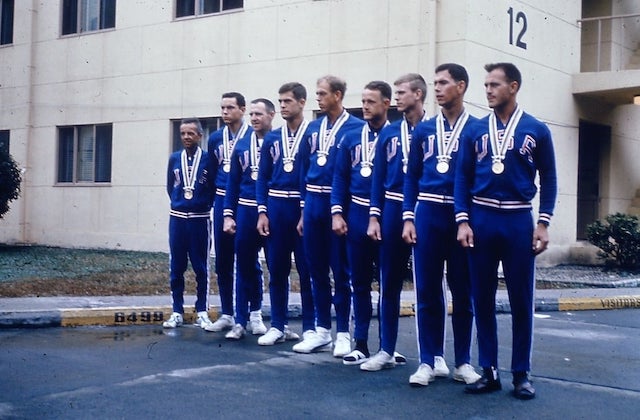
Great story Joe. Not just about the winners of the Olympics but the rich Donegal connection. I wonder if medalist Budd’s McKinley family of origin in Donegal is connected to the family of President William McKinley whose a Scotch-Irish family also hailed from from Ulster and were among Pennsylvania’s earliest settlers. Like Budd, we’ll all be watching the rowing brothers from Skibbereen (Paul and Gary O’Donovan) who won silver last time. Thanks for the story. It’s a movie.
Very interesting, and very Joe Quinlanish. Get him started on a topic and you’re never sure where he’s going to take you, but you know the journey will be intriguing.